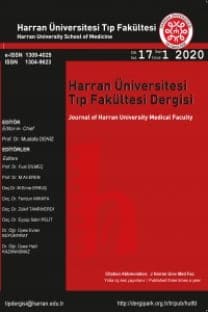Cisplatin’in Normal ve Prostat Kanseri Hücrelerinin Aminoasit Metabolizması Üzerine Etkileri
Prostat kanseri, Cisplatin, Aminoasit Metabolizması, Metabolomik
Effects of Cisplatin on Amino Acid Metabolism of Normal and Prostate Cancer Cells
Prostate cancer, Cisplatin, Amino acid Metabolism,
___
- 1. Zhu W, Li Y, Gao L. Cisplatin in combination with programmed cell death protein 5 increases antitumor activity in prostate cancer cells by promoting apoptosis. Molecular Medicine Reports. 2015;11(6):4561-6.
- 2. Thomsen FB, Brasso K, Klotz LH, Røder MA, Berg KD, Iversen P. Active surveillance for clinically localized prostate cancer––A systematic review. Journal of surgical oncology. 2014;109(8):830-5.
- 3. van den Bergh RC, Albertsen PC, Bangma CH, Freedland SJ, Graefen M, Vickers A, et al. Timing of curative treatment for prostate cancer: a systematic review. European urology. 2013;64(2):204-15.
- 4. Bray F, Ferlay J, Soerjomataram I, Siegel RL, Torre LA, Jemal A. Global cancer statistics 2018: GLOBOCAN estimates of incidence and mortality worldwide for 36 cancers in 185 countries. CA: a cancer journal for clinicians. 2018;68(6):394-424.
- 5. Wilkins LJ, Tosoian JJ, Sundi D, Ross AE, Grimberg D, Klein EA, et al. Surgical management of high-risk, localized prostate cancer. Nature Reviews Urology. 2020;17(12):679-90.
- 6. Powers E, Karachaliou GS, Kao C, Harrison MR, Hoimes CJ, George DJ, et al. Novel therapies are changing treatment paradigms in metastatic prostate cancer. Journal of hematology & oncology. 2020;13(1):1-13.
- 7. Watson PA, Arora VK, Sawyers CL. Emerging mechanisms of resistance to androgen receptor inhibitors in prostate cancer. Nature Reviews Cancer. 2015;15(12):701-11.
- 8. Huang H, Li P, Ye X, Zhang F, Lin Q, Wu K, et al. Isoalantolactone Increases the Sensitivity of Prostate Cancer Cells to Cisplatin Treatment by Inducing Oxidative Stress. Frontiers in Cell and Developmental Biology. 2021:809.
- 9. Pignot G, Maillet D, Gross E, Barthelemy P, Beauval J-B, Constans-Schlurmann F, et al. Systemic treatments for high-risk localized prostate cancer. Nature reviews Urology. 2018;15(8):498-510.
- 10. Rottenberg S, Disler C, Perego P. The rediscovery of platinum-based cancer therapy. Nature Reviews Cancer. 2021;21(1):37-50.
- 11. Su F, Ahn S, Saha A, DiGiovanni J, Kolonin MG. Adipose stromal cell targeting suppresses prostate cancer epithelial-mesenchymal transition and chemoresistance. Oncogene. 2019;38(11):1979-88.
- 12. de Porras VR, Wang XC, Palomero L, Marin-Aguilera M, Solé-Blanch C, Indacochea A, et al. Taxane-induced attenuation of the CXCR2/BCL-2 axis sensitizes prostate cancer to platinum-based treatment. European urology. 2021;79(6):722-33.
- 13. Valentovic MA. Evaluation of resveratrol in cancer patients and experimental models. Advances in cancer research. 2018;137:171-88.
- 14. Wang L, Zhao X, Fu J, Xu W, Yuan J. The role of tumour metabolism in cisplatin resistance. Frontiers in Molecular Biosciences. 2021;8:691795.
- 15. Yoshida GJ. Metabolic reprogramming: the emerging concept and associated therapeutic strategies. Journal of experimental & clinical cancer research. 2015;34(1):1-10.
- 16. Biswas SK. Metabolic reprogramming of immune cells in cancer progression. Immunity. 2015;43(3):435-49.
- 17. van der Mijn JC, Panka DJ, Geissler AK, Verheul H, Mier JW. Novel drugs that target the metabolic reprogramming in renal cell cancer. Cancer & metabolism. 2016;4(1):1-18.
- 18. Li C, Zhang G, Zhao L, Ma Z, Chen H. Metabolic reprogramming in cancer cells: glycolysis, glutaminolysis, and Bcl-2 proteins as novel therapeutic targets for cancer. World journal of surgical oncology. 2015;14(1):1-7.
- 19. Sun L, Suo C, Li S-t, Zhang H, Gao P. Metabolic reprogramming for cancer cells and their microenvironment: Beyond the Warburg Effect. Biochimica et Biophysica Acta (BBA)-Reviews on Cancer. 2018;1870(1):51-66.
- 20. Akmeşe Ş, Temiz E, Koyuncu İ, Taşkıran H, Tüysüz MZ. Farklı Meme Kanseri Hücre Hatlarında Karnitin Metabolizmasının İncelenmesi. Harran Üniversitesi Tıp Fakültesi Dergisi. 2022;19(1):1-7.
- 21. Wei Z, Liu X, Cheng C, Yu W, Yi P. Metabolism of amino acids in cancer. Frontiers in cell and developmental biology. 2021;8:603837.
- 22. Melchini A, Traka MH. Biological profile of erucin: a new promising anticancer agent from cruciferous vegetables. Toxins. 2010;2(4):593-612.
- 23. Arslan E, Koyuncu I. Comparison of Amino Acid Metabolisms in Normal Prostate (PNT-1A) and Cancer Cells (PC-3). Oncologie. 2021;23(1).
- 24. Yoo H-C, Han J-M. Amino Acid Metabolism in Cancer Drug Resistance. Cells. 2022;11(1):140.
- ISSN: 1304-9623
- Yayın Aralığı: Yılda 3 Sayı
- Başlangıç: 2004
- Yayıncı: Harran Üniversitesi Tıp Fakültesi Dekanlığı
İndirekt Hiperbilirubinemide Exchange Transfüzyon Uygulanması: Tek Merkez Deneyimi
Geriatrik Hastalarda Yanık Yaralanmalarının Epidemiyolojik İncelenmesi: 10 Yıllık Analiz
Hüseyin Avni DEMİR, Çağatay ÇAVUŞOĞLU, Nadire DİNÇ
Sunay Sibel KARAYOL, Mustafa SEVER, Saime SHERMATOVA, Abdurrahim DUSAK
Bal Arısı Sokması Sonrası Gelişen Katarakt
Ali ŞİMŞEK, Çağrı MUTAF, Eren HÜZMELİ
Hafize Gülşah ÖZCAN, Tuğba BİNGÖL TANRIVERDİ, Burcu AVCI ÖZBALIK, Melek GÜRA ÇELİK
Hemogram Parametrelerinin Antagonist Protokollü IVF-ICSI Siklus Başarısını Öngörmede Etkisi
Uğur DEĞER, Yunus ÇAVUŞ, Gülcan OKUTUCU, Nurullah PEKER
Baki Volkan ÇETİN, Mehmet Akif ALTAY, Serkan SİPAHİOĞLU, İzzettin YAZAR
Yiğit KILIÇ, Ayşegül KÜÇÜK, Mustafa ARSLAN, Mehmet KİRİŞÇİ, Abdullah OZER, Tülay MORTAŞ, Gülay KİP, Levent OKTAR, Mustafa KAVUTCU
